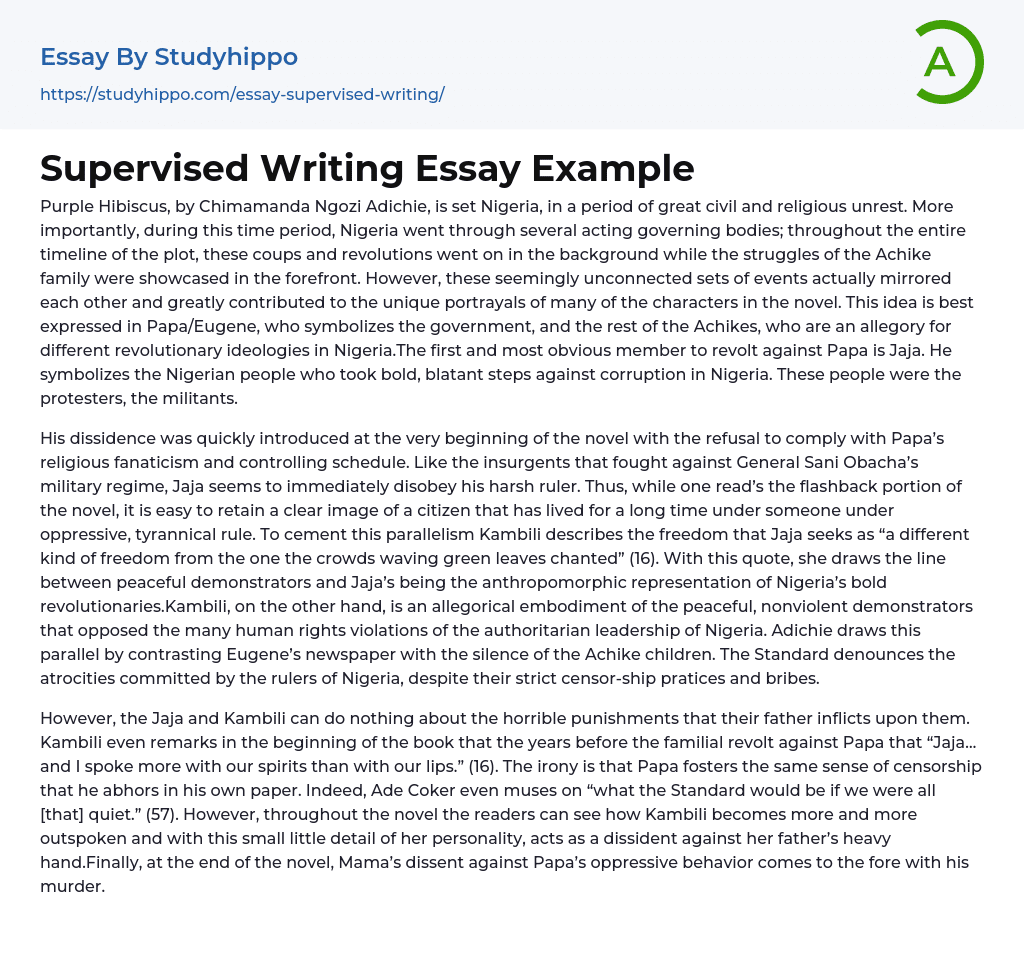In Chimamanda Ngozi Adichie's Purple Hibiscus, the story is set in Nigeria during a period of civil and religious unrest. Nigeria experienced multiple acting governing bodies during this time, with coups and revolutions happening in the background while the challenges faced by the Achike family took center stage. Surprisingly, these seemingly unrelated events reflected each other and greatly influenced the portrayal of characters in the novel. Papa/Eugene represents the government, while the Achike family symbolizes various revolutionary ideologies in Nigeria. Jaja is the most obvious member who rebels against Papa, embodying the Nigerian people who boldly fought against corruption, such as protesters and militants.
The dissidence of Jaja is evident from the start of the novel, as he rejects Papa's religious extremism and controlling schedule. Similar to the insurgents who fought against General Sani Obacha's military regime, Jaja does not
...conform to his harsh ruler. Through the flashback portion of the novel, it becomes clear that Jaja has lived under oppressive and tyrannical rule for a long time. To emphasize this parallel, Kambili describes the freedom that Jaja seeks as distinct from the freedom chanted by the crowds waving green leaves. This quote showcases Jaja as an anthropomorphic representation of Nigeria's bold revolutionaries. In contrast, Kambili represents the peaceful nonviolent demonstrators who opposed the human rights violations of Nigeria's authoritarian leadership. Adichie highlights this parallel by contrasting Eugene's newspaper with the silence of the Achike children. Despite strict censorship practices and bribes, The Standard denounces the atrocities committed by Nigeria's rulers.
Despite the unbearable punishments inflicted upon them by their father, Jaja and Kambili are powerless to do anything about it. Kambili even mentions at the beginnin
of the book that before the rebellion within the family, "Jaja and I communicated more through our spirits than with our words." (16). The ironic thing is that Papa promotes the same kind of censorship that he detests in his own newspaper. Ade Coker even wonders what would happen to the Standard if everyone were as silent as Papa. (57). However, as the novel progresses, readers witness how Kambili becomes more and more outspoken, using this small aspect of her personality to challenge her father's oppressive ways. In the end, Mama's resistance against Papa's oppressive behavior becomes evident with his murder.
The deed was not simply a killing; it was done using poison. This parallels the death of the despotic military dictator who ruled for most of the book. Known as Big Oga, General Obacha died suddenly and under suspicious circumstances in 1998. The announcement of Papa's death, that he was poisoned, was given in a short paragraph, devoid of emotion. It provided the facts but did not reveal Mama or Kambili's feelings towards the revelation of the murder. General Obacha's death was not widely reported and its true details remain a mystery even after almost 15 years. However, his death marked the beginning of Nigeria's gradual reformation and political progress, just as Papa's death allowed the fractured psyches of the remaining Achike family members to heal.
The Achike family members symbolize the different groups in Nigeria. Their family dynamics and the challenges they face reflect the political environment of Nigeria in the 1990s. Therefore, Adichie's depiction of the characters serves as her critique on the political ideologies present in Nigeria during that period.
- Culture essays
- Social Control essays
- Citizenship essays
- Social Justice essays
- Caste System essays
- Social Responsibility essays
- Socialization essays
- Deviance essays
- Modern Society essays
- Popularity essays
- Civil Society essays
- Community essays
- Female essays
- Filipino People essays
- Igbo People essays
- Indigenous Australians essays
- Indigenous Peoples essays
- Minority Group essays
- Social Institution essays
- Men essays
- The nation essays
- Middle Class essays
- Social Norms essays
- Discourse Community essays
- Popular Culture essays
- Car Culture essays
- American Culture essays
- Mormon essays
- Indian Culture essays
- Mexican Culture essays
- Pop Culture essays
- Cultural Differences essays
- Culture Shock essays
- Different Cultures essays
- World War I essays
- World War Ii essays
- Atomic Bomb essays
- American Civil War essays
- Attack essays
- Cold War essays
- Crimean War essays
- Emilio Aguinaldo essays
- Iraq War essays
- Korean War essays
- Nazism essays
- Nuclear Weapon essays
- Philippine Revolution essays
- Trench Warfare essays
- Vietnam War essays
- Western Front essays




